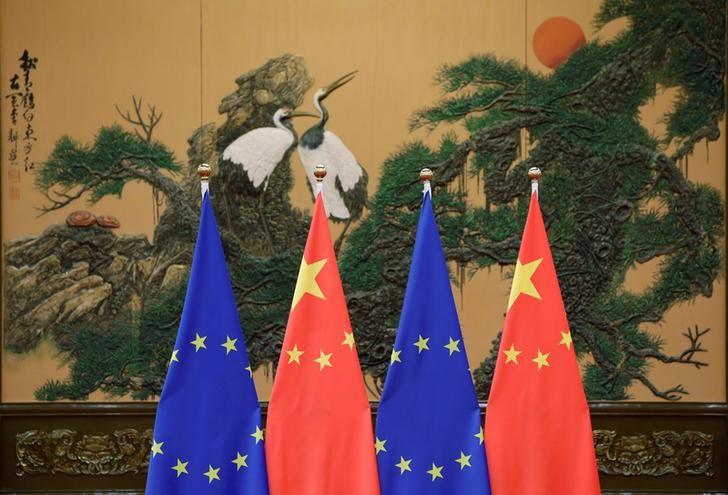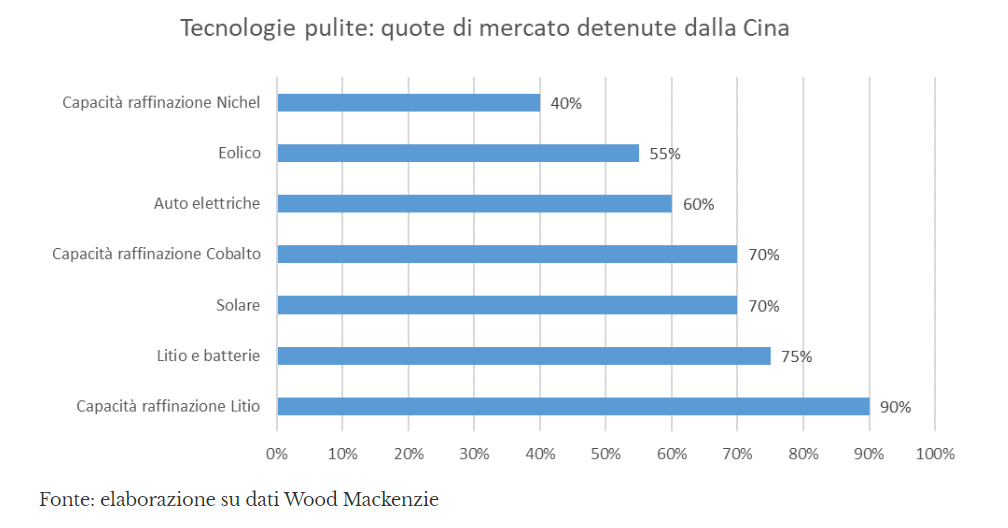Energy, will Europe surrender to China with the recovery plan?

After years of climate leadership based on the soft power of a good example, the EU must be careful not to surrender itself to total technological dependence on China. The analysis by Alberto Clò, director of Energia and RivistaEnergia.it
Wood Mackenzie recently published a report on China which certifies its absolute dominance in a large part of clean technologies, with the following market shares on world production.
A framework destined over time to strengthen the Chinese industry with percentages close to or above 80%, placing it in a situation of quasi-monopoly.

Countries, Europe in the lead, committed to designing climate policies aimed at achieving full carbon neutrality in a few decades should take this into account, given the great importance of the geopolitical variable in the energy game.
How China moves
Dependence on foreign oil or methane supplies exposes you to risks of political vulnerability, but it is one thing to depend on a plurality of supplier countries in globalized markets, another to depend on a quasi-monopolist.
China has fueled its extraordinary growth in the use of fossil fuels (80% of total consumption) and metals. Despite the enormous investments it has made abroad, especially in Africa, its direct ownership of oil and methane remains marginal (around 17% of domestic demand) so that its dependence on foreign countries is progressively increasing (expected in 1980). % for oil and 50% for methane).
Energy independence – based on the 14th five-year plan (see the comment on the Dual Circulation Strategy published on this blog) – has become an absolute priority for Beijing that it intends to pursue with the climate strategy: not only to reduce emissions (today it is the first world emitter, with 28% of the total) but also to gain, at national level, full sovereignty over energy and, on the international level, the domination of clean technologies, thanks to the advantage of having been the first mover.
China vs United States: climate leadership passes from the energy domain
The energy dominance that the United States intends to achieve in oil & gas, becoming the world's leading producer, has thus been contrasted with the objective of China's energy dominance in new technologies, in the related supply chains, in basic materials – metals and earth. rare in the first place – they need.
The green revolution advocated by the Western States, in technologies dominated by China (solar and wind), neglecting (coincidentally?) Those in which it is absent, goes exactly in this direction.
China will derive the greatest industrial advantages and the greatest power of international interdiction, recalling the cases of export restrictions it has imposed. In conclusion, the prospect of a progressive marginalization of fossils to the benefit of green technologies plays in favor of China and to the disadvantage of the United States. Who could hardly accept it for political and industrial reasons.
The United States has lost the first technological battle against China: photovoltaics
The lack of interest in new technologies, which did not fall within the 'America First' perspective of Donald Trump, but also of Barack Obama, made America lose ground in many sectors, starting with the photovoltaic one.
The run-up to climate leadership "by changing everything so as not to change anything, that is, by remaining the engine of the energy sector" is now at the center of Biden's America, as Gaetano Di Tommaso pointed out in the last issue of ENERGIA. Although the outcome is still difficult to predict.
However, things could change with the 2,000 billion dollars (1% of GDP) plan to be spent by the end of the decade proposed by Joe Biden to Congress, which will have to approve it, to modernize the system of national infrastructures, especially those of transport where Federal spending has been at its lowest for six decades.
American e-car first: Biden's move to regain ground in the electric car
From 2015 to 2018, the United States imported 80% of the rare earths from China. If America is to gain space on the electric car market, it will have to outperform its competition.
President Biden has asked Congress to give consumers discounts and incentives to buy American electric cars, making sure that even lower-income families can do so (social detail we overlook).
Another technology that the American administration intends to favor is that of carbon capture and storage (CCS) on which both environmentalist movements and the oil industry agree (unlike us), involving, with 10 pioneering projects, power plants and industries that are difficult to decarbonise (hard-to-abate) such as steel and cement.
And Europe?
And Europe? How are its climate policies configured with respect to the dominant role that Beijing is destined to assume today and in the future, so as to place itself in a position of subordination with respect to it?
The 27 member countries are faced with a double perspective: on the one hand, reducing foreign dependence on fossil fuels thanks to the penetration of renewables, but, on the other, simultaneously increasing dependence on the Chinese monopoly.
The perception of Europe's vulnerability to China has significantly increased in politics and public opinion with the bitter experience of Covid-19, which has raised serious questions about the vulnerability of its value chains disclosed by relocation processes.
As Romano Prodi points out on the pages of ENERGIA 4.20 "The three major economic areas of the world, namely China, Europe, the United States, while maintaining substantial economic relations between them, will therefore give rise to a reshoring process dedicated to bringing albeit minimal activities necessary to control the various steps that characterize the value chains of their products ".
Despite this, the EU's foreign policy, its climate diplomacy, believes that partnership with China is possible and desirable. Because what China does will be decisive in protecting Europe from the feared effects of climate change, to the point of claiming as its success the more formal than substantial commitment of President Xi Jinping to achieve carbon neutrality by 2060.
All sorts of partnerships between Europe and China will intersect opposing geopolitical and geoeconomic interests
However, all sorts of partnerships will intersect opposing geopolitical and geoeconomic interests. President Ursula von der Leyen affirmed that the Commission will be 'geopolitical' in defending the interests of the Union based on the objective of European Strategic Autonomy. It would be hoped that this would also happen in the climatic choices, but things seem to turn in another direction.
The implementation of the European Green Deal and the ample resources made available in the Next Generation EU for its implementation are in fact leading the generality of European states to sectoral choices that will inevitably determine a growing and lasting dependence on China.
There is nothing in this strategy comparable to Joe Biden's for giving America autonomy in new green technologies. Just as there is no attempt to initiate effective cooperation with the United States, within a reaffirmed centrality of the Atlantic alliance – as advocated by Enrico Letta on this blog – nor, in hindsight, in relations between the Member States themselves.
Extract from an article published on ENERGIA, here the full version.
This is a machine translation from Italian language of a post published on Start Magazine at the URL https://www.startmag.it/energia/energia-col-recovery-plan-leuropa-si-consegnera-alla-cina/ on Sun, 09 May 2021 05:02:57 +0000.
